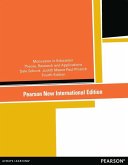This substantially revised text provides a comprehensive, highly accessible, and student friendly introduction to the principles, concepts, and methods currently used in educational research.
This text provides a balanced combination of quantitative and qualitative methods and enables students to master skills in reading, understanding, critiquing, and conducting research. Many examples and article excerpts are used throughout the text to demonstrate and highlight best practices in educational research. Evidence-based inquiry is emphasized in two ways: (1) Introductory chapters focus on the added importance of data driven decision-making, (2) Methodological chapters provide explicit guidelines for conducting empirical studies.
Features + Benefits
Balanced Coverage. The treatment of qualitative research is parallel to that of quantitative research to enable students to better understand all approaches to research.
Extensive Use of Examples. Numerous updated excerpts from published studies gradually introduce students to the style and format of published articles. Examples of complete articles illustrate different methodologies.
Thoughtful Pedagogy. Each chapter includes instructional aids that provide a user-friendly framework, such as key terms, application problems, concept maps, criteria for evaluating studies, and the new MyEducationLab for Research website.
Extensive Use of Internet. The Internet's application for research is presented throughout.
Appendix D: Glossary
Chapter 1: Introduction to Evidence-Based Inquiry
Chapter 2: Research Designs and Reading Research Reports
Chapter 3: Research Problems, Questions and Hypotheses
Chapter 4: Review of Literature
Chapter 5: Designing Quantitative Research: Purpose, Validity, and Ethical Considerations
Chapter 6: Participants, Subjects and Sampling for Quantitative Designs
Chapter 7: Descriptive Statistics
Chapter 8: Quantitative Data Collection: Technical Adequacy
Chapter 9: Collecting Quantitative Data
Chapter 10: Nonexperimental Research Designs, Surveys, and Secondary Data Analysis
Chapter 11: Experimental, Quasi-Experimental, and Single-Subject Designs
Chapter 12: Understanding and Reporting Inferential Data Analyses
Chapter 13: Designing Qualitative Research
Chapter 14: Collecting Qualitative Data
Chapter 15: Qualitative Data Analysis
Chapter 16: Mixed-Methods Designs
Chapter 17: Concept Analysis and Historical Research
Chapter 18: Evaluation Research and Policy Analysis
Chapter 19: Action Research
Appendix A: Answers to Application Problems
Appendix B: Guidelines for Writing Research Proposals
Appendix C: Guidelines for Writing Research Reports
Appendix E: Calculations for Selected Descriptive and Inferential Statistics
Hinweis: Dieser Artikel kann nur an eine deutsche Lieferadresse ausgeliefert werden.
This text provides a balanced combination of quantitative and qualitative methods and enables students to master skills in reading, understanding, critiquing, and conducting research. Many examples and article excerpts are used throughout the text to demonstrate and highlight best practices in educational research. Evidence-based inquiry is emphasized in two ways: (1) Introductory chapters focus on the added importance of data driven decision-making, (2) Methodological chapters provide explicit guidelines for conducting empirical studies.
Features + Benefits
Balanced Coverage. The treatment of qualitative research is parallel to that of quantitative research to enable students to better understand all approaches to research.
Extensive Use of Examples. Numerous updated excerpts from published studies gradually introduce students to the style and format of published articles. Examples of complete articles illustrate different methodologies.
Thoughtful Pedagogy. Each chapter includes instructional aids that provide a user-friendly framework, such as key terms, application problems, concept maps, criteria for evaluating studies, and the new MyEducationLab for Research website.
Extensive Use of Internet. The Internet's application for research is presented throughout.
Appendix D: Glossary
Chapter 1: Introduction to Evidence-Based Inquiry
Chapter 2: Research Designs and Reading Research Reports
Chapter 3: Research Problems, Questions and Hypotheses
Chapter 4: Review of Literature
Chapter 5: Designing Quantitative Research: Purpose, Validity, and Ethical Considerations
Chapter 6: Participants, Subjects and Sampling for Quantitative Designs
Chapter 7: Descriptive Statistics
Chapter 8: Quantitative Data Collection: Technical Adequacy
Chapter 9: Collecting Quantitative Data
Chapter 10: Nonexperimental Research Designs, Surveys, and Secondary Data Analysis
Chapter 11: Experimental, Quasi-Experimental, and Single-Subject Designs
Chapter 12: Understanding and Reporting Inferential Data Analyses
Chapter 13: Designing Qualitative Research
Chapter 14: Collecting Qualitative Data
Chapter 15: Qualitative Data Analysis
Chapter 16: Mixed-Methods Designs
Chapter 17: Concept Analysis and Historical Research
Chapter 18: Evaluation Research and Policy Analysis
Chapter 19: Action Research
Appendix A: Answers to Application Problems
Appendix B: Guidelines for Writing Research Proposals
Appendix C: Guidelines for Writing Research Reports
Appendix E: Calculations for Selected Descriptive and Inferential Statistics
Hinweis: Dieser Artikel kann nur an eine deutsche Lieferadresse ausgeliefert werden.








